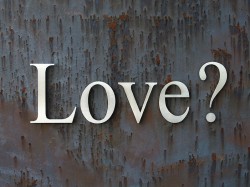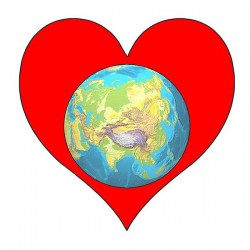Get your mind the hell out of its way!
It took me a few months to write this article.
As a committed philosopher of life, I’ve been contemplating this question for many years, and for almost as long I’ve believed that when we love someone it is conditional.
In one way I still feel the same yet in another I don’t, so let me elaborate.
At our very core, we are unconditional love. We are born out of it. We are an expression of it. Yet generally when we feel love—human ego love—-it’s a tainted illustration of this primary vibration. It’s our way of experiencing its powerful energy.
But let’s start at the basics. What is love? Purely grounded in the definition, love is a strong feeling of affection towards someone or something. Moreover, affection is a gentle feeling of fondness or liking.
This brings up a point that I want to emphasize: there is no distinction between loving someone and liking someone except to the degree we feel that affection. At some mysterious point, we like them so strongly that we love them.
Therefore, if we love someone, it is inclusive of how we like them.
What then, is unconditional love? It is defined as strong affection without any limitations. It’s unrestricted and unchanging. This means that to love someone with no restrictions implies that we also like them with no restrictions.
But is that even possible? Let’s find out.
How many times have we heard “I love my children unconditionally”, or “I have unconditional love for my partner”? Way too many times to always be true.
Unconditional love appears beyond possibility when considering the experiences, little and large, which easily change the way a person feels about another. Affection fluctuates through the variety of other emotions that we feel. How often have we heard someone say: “I hate them right now!”
Additionally, the depth of love a person has for another usually changes during different periods of a person’s life. For example, when we meet our future partner, we don’t love them in that first moment do we? Therefore, we must assume that unconditional love would not involve these types of limitations.
Let’s have a thought experiment: what would happen to the love of a parent whose child subjected them to a heinous trauma? What about the love of a person whose partner decided that they wanted a polyamorous relationship? Would both still feel the same?
In most cases I doubt it. Given the number of people I’ve encountered who have abandoned their children, parents, other family members, friends, love’s-of-their-lives etc., it doesn’t appear that unconditional love is all that common.
And that’s not even considering those of us who continue to maintain our strained relationships yet at the same time, either explicitly or secretly, project judgement, disappointment, anger, sadness, or even hate onto that other person. I mean, doesn’t there have to be conditions on their affection if they sometimes feel differently?
It would appear logically so. Now please be assured that I’m not saying that we can’t always have love for someone no matter what they put us through. Sure, we may still have strong affection for someone even if we are angry at them, or even if we break up with them, but given the definition, is it unchanging love?
I know right now some of us may be thinking: “We do love them unconditionally; it’s just that we don’t like certain aspects about them!” As I hinted above, to like or not like aspects of something is just another way of saying “I have conditions on how I feel affection for that something”.
Unconditional love implies that there is no other way we feel—there is no scale of affection—it is just pure love for all of that being.
Yet if our loved one is mean to us, it changes the way we feel affection for them. It also changes if they are good to us. The way we feel affection towards another person changes, which inherently implies that it is conditional love.
How can you love those who have stolen from you, assaulted or abused you, or tried to blow you up and completely destroy you? How can you forgive those who have kidnapped, tortured and killed someone you love? Yet this is where reconciliation has to begin. ~ Andrew White
This quote is not meant to represent unconditional love. Instead, it represents that although we may have conditions on how we feel about their actions, we can still feel love for them.
In this light, can we then feel unconditional love for someone, which remains unaltered, no matter how we feel about how they live their lives? Instead of having conditions on them as an individual, can we just have conditions on how they operate as an individual? For example, can a person who’s loved one did a horrible thing to them, choose to no longer want them in their lives, but still love them unconditionally?
It can be strongly argued that a person’s thoughts, feelings and actions are a part of who they are. And I agree. We may still have strong love for a part of them, but all their behaviors and everything else about how they operate are features of that person. To unconditionally love someone we must always feel love regarding every element of them, including their poor behaviors, with absolutely no exceptions. We would have no judgement, no other degree of affection, at all.
We then might say “Hang on a minute, we do love them unconditionally, yet we just want what’s the best for them”. For starters, we should ask ourselves “how do we truly know what’s best for them?”
Maybe we just want what’s best for how we feel about them? Maybe we want what we want for them?
And that isn’t necessarily a bad thing, as long as it is healthy for everyone involved. For example, if we encourage our loved one to overcome their addiction which is ruining their own life and making others suffer, then that would be a healthy attachment to the way that we feel about them and their behaviors.
But if we expect our loved one to behave in a way just because we believe it is the right way, then that would be an unhealthy attachment to the way that we feel about them.
The amount of times we’ve seen a person’s expectations of their loved one get in the way of a genuine and balanced relationship is scarily common, which is why it is relevant to mention here.
Ultimately, it appears that the love that our ego feels is conditional love. It is personal love. It is human love. Because unconditional love is filtered through an ego, it only exists in that form by virtue of the fact that our ego exists. The love that we feel is fundamentally conditional love.
Yes, just like in my article ‘We Can’t Fall In Love Alone’, this argument is purely semantic. Its purpose is for self-empowerment. It is in no way aimed to govern how we feel love; that is entirely up to each individual and cannot be determined by anyone but that person.
I open this discussion so that we can better understand and process our experience of love. The amount of times we’ve heard someone say that they love someone unconditionally, and then proceed to contradict that statement, is absurd. Evidently, a large portion of us needs to reevaluate what love actually is.
To reiterate, unconditional love is defined as complete and unrestricted love. If we have unconditional love for somebody, it has, is and will always be complete. It would always be unchanging.
Yet can any of us honestly say that how we feel affection toward another person has never changed? Of course we can’t, it changes from behavior to behavior and from year to year, and hopefully the way it has changed overall is a deeper and stronger feeling of love.
So just like a parent’s love for their child grows, or dwindles, how we experience the feeling of love changes.
Alright, so if it seems conceptually illogical for an ego to unconditionally love, can we experience unconditional love at all?
I believe so. As previously asserted, we are the expression of unconditional love. The more we remove our ego’s conditions—the expectations, desires and ideas of love—the closer we experience unconditional love. If we could remove our ego entirely, through practices such as meditation, then we would not just experience unconditional love, we would literally be it.
There are plenty of mystics that advocate that unconditional love is what reality is fundamentally made of. This belief also resonates with me too, so I figure the closest way we may feel unconditional love is by attempting to have it for ourselves, reality and everything in it. For life. For the universe. And of course for spirit (or Energy, God, Unconditional Love or whatever else you prefer to call the Universal Source).
We can also allow this primordial vibration, with its intense innate beauty, to be the basis of how we think, feel and behave. And if our first thought is: “I love unconditionally”, then we have arrived at a paradox. The only condition on our love is that we have no conditions. In this sense, I think we may even be able to ontologically trick God into allowing it.
But the reality is, as emotional roller-coasters, we have our down days.
Sometimes we don’t like other’s actions, shit that happened or even ourselves. There’s even an acronym for it: FML (Fuck My Life). So kudos to everyone that comes close to maintaining a near permanent and egoless expression of unconditional love. For the sake of our future, we need more people like you.
To summarize, if we use the conventional understanding of what unconditional love is—for example, that a parent can still always love their child even if they’re angry at them in a particular moment—then yes it is everywhere. But that definition appears misleading because unconditional love is technically an unchanging affection towards someone or something else.
So in the technical version, there is zero tolerance for degrees of affection. And we know we feel differently at different times: we feel many things in our lives and feel many ways towards our loved ones.
If we get angry at someone we love, anger replaces that feeling and when it subsides, the feeling of love returns. No doubt the belief of love has remained somewhere in the subconscious mind and if we trace it back as far as we can go we will arrive at the interconnected source: unconditional love.
But it has still changed. The feeling of it has changed.
In any case, we’re human and we experience human love. And when you consider our true experience of love, it is inherently conditional regardless if we like it or not.
Now please let me assure you that I didn’t write this article just to put a downer on everyone. Another reason it took me so long to publish it was that I wasn’t sure if I was able to provide any positives for its readers, but then I realized there is something really important to share.
I raised this discussion because I believe it helps us to better understand our feelings and our relationships, especially with ourselves. The beneficial aspect of conceptualizing love in this way is that it forces us to face our conditions that influence our affection and love.
In what ways to we expect our loved ones to treat us for our affection to always remain strong for them?
If we ask ourselves this question it can help to determine if we’re putting realistic and functional restrictions in our relationships, or the opposite. Are our conditions fair to ourselves and others? Are our conditions likely to make us feel anxious and discontent more often than not? If so, how can we change them?
Through my experience working in the therapeutic sector it has become consistently clear that some people ruin their loving relationships because they have placed higher expectations on their partners. Their conditions are just way too unrealistic and their partner is unable to meet them. Then they blame their partner for destroying the relationship, when it was their conditions that set it up for failure and not success in the first place.
And that is also applicable to how we treat ourselves too.
Another benefit of accepting our conditions on love, for what they are, is that it can drive us to strive for more unique and genuine experiences of ego love. If we remove a box or two that our ego thought it wanted ticked, we might just find the imperfectly perfect relationship.
We really do influence how we love ourselves and others; we really have that much power.
I encourage you to comment if you have a conflicting view or have something to add. This is a very interesting subject and I have no doubt that we still have a lot to learn about it, so you’re more than welcome to shed some light to myself and the readers.
But ultimately, we should never forget to always love everything; no matter the conditions that we put on it.
Judge nothing, you will be happy. Forgive everything, you will be happier. Love everything, you will be happiest. ~ Sri Chinmoy
Love elephant and want to go steady?
Sign up for our (curated) daily and weekly newsletters!
Editor: Renée Picard
Photos: Wikimedia Commons / Wikimedia Commons / Wikimedia Commons / Wikimedia Commons















Read 0 comments and reply